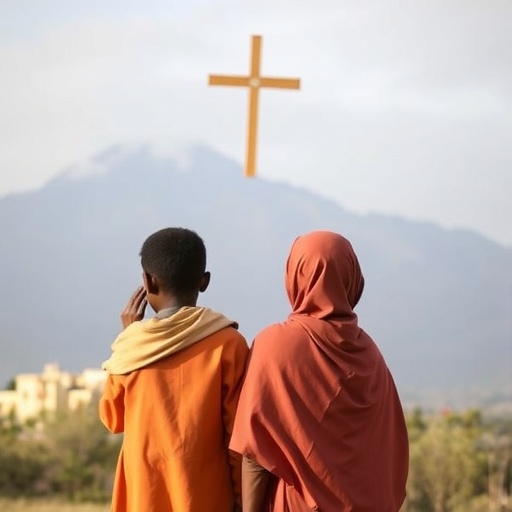In the realm of educational research, a groundbreaking study conducted by T. Kassa delves into a fascinating yet often overlooked aspect of children’s rights within the context of Ethiopian Orthodox Church education. Specifically, Kassa’s work, titled “Child rights provisions among Yekolo Temari: examining the lived experiences of children in classical schools of the Ethiopian Orthodox Church,” published in the Journal of Religious Education, unravels the intricate dynamics that shape the educational experiences of children enrolled in these classical institutions. The research provides a compelling narrative that underscores the importance of understanding children’s rights in traditional educational settings, offering insights that resonate globally.
The study is particularly significant as it sheds light on the Yekolo Temari, a traditional educational framework deeply rooted in Ethiopian Orthodox Christianity. Within this context, the lived experiences of children are essential for grasping how educational practices and cultural norms intersect. Kassa meticulously explores how these children navigate their rights and responsibilities while immersed in an educational system that has flourished for centuries. This investigation opens a broader dialogue about the importance of children’s rights in religiously affiliated educational settings, where cultural heritage often influences pedagogical approaches.
At the heart of Kassa’s research lies a critical examination of how children’s rights are perceived and implemented within the Yekolo Temari framework. The study reveals that, despite the rich cultural and religious tapestry that supports these classical schools, there exists a significant gap between the ideal of children’s rights and the realities faced by the children within these institutions. Kassa emphasizes the need for an ongoing dialogue about these rights, advocating for a paradigm shift that considers the unique cultural contexts in which these rights are exercised.
Methodologically, Kassa employs a qualitative approach, engaging directly with the voices of the children who inhabit these educational spaces. Through interviews and ethnographic observations, the study captures a nuanced understanding of the expectations, aspirations, and challenges faced by students. This human-centric approach ensures that the research conveys the emotional and social dimensions of their experiences, offering readers an intimate glimpse into their lives.
One of the standout findings of the research is the interplay between academic learning and spiritual development in Yekolo Temari settings. Kassa illustrates how religious teachings are interwoven with educational content, creating a unique learning environment that fosters both intellectual and spiritual growth. However, this duality also raises questions about the prioritization of children’s rights. As religious and educational authorities shape the curriculum, the balance between spiritual engagement and the promotion of individual rights becomes increasingly complex.
The research highlights that many children within these classical schools express a desire for more agency in their learning processes. They articulate the need for a curriculum that reflects not only religious teachings but also their rights as individuals. This desire for participation and recognition is a universal theme that transcends cultural boundaries, making Kassa’s findings relevant to broader discussions on child agency in education around the world.
Furthermore, the study discusses how socio-economic factors influence the educational experiences of these children. The challenges faced by families, including financial constraints and societal expectations, often impact children’s access to education and their ability to exercise their rights fully. Kassa’s research emphasizes the importance of understanding these socio-economic dynamics to foster a more equitable educational landscape where children can thrive.
Kassa’s work also brings to light the crucial role of educators and religious leaders in advocating for children’s rights within these settings. By examining the attitudes of teachers and religious figures toward child rights, the study showcases the potential for positive change when educators are equipped with the knowledge and skills to uphold these rights. Kassa calls for training programs that empower educators to recognize and promote children’s rights, thus enhancing the overall learning experience.
The implications of this research extend beyond Ethiopia, resonating with global discussions on children’s rights in various educational contexts. As countries around the world grapple with the principles set forth in the United Nations Convention on the Rights of the Child, Kassa’s findings serve as a reminder of the need to contextualize these rights within specific cultural and religious frameworks. The study advocates for a collaborative approach that involves policymakers, educators, and communities working together to promote a more inclusive educational environment for children.
In conclusion, T. Kassa’s research represents a pivotal contribution to the field of educational research and children’s rights. By intertwining the lived experiences of children with a rigorous examination of their rights within the Yekolo Temari framework, Kassa not only enriches our understanding of education in Ethiopia but also inspires a global dialogue about the imperative of recognizing and upholding children’s rights in all educational settings. As we move forward, it is essential to continue advocating for children’s voices, ensuring they are not merely subjects of education but active participants in shaping their learning journeys.
This work challenges traditional notions of education, urging stakeholders to rethink approaches that prioritize the rights and agency of children, particularly in environments that are deeply entrenched in religious and cultural traditions. The journey toward realizing children’s rights is ongoing, and studies like Kassa’s are vital in illuminating the pathways toward a more equitable and just educational landscape for all children.
Subject of Research: Children’s rights provisions in Ethiopian Orthodox Church educational settings.
Article Title: Child rights provisions among Yekolo Temari: examining the lived experiences of children in classical schools of the Ethiopian Orthodox Church.
Article References: Kassa, T. Child rights provisions among Yekolo Temari: examining the lived experiences of children in classical schools of the Ethiopian Orthodox Church. j. relig. educ. 72, 255–262 (2024). https://doi.org/10.1007/s40839-024-00231-6
Image Credits: AI Generated
DOI: 10.1007/s40839-024-00231-6
Keywords: children’s rights, Ethiopian Orthodox Church, Yekolo Temari, education, socio-economic factors, child agency, qualitative research, religious education.




